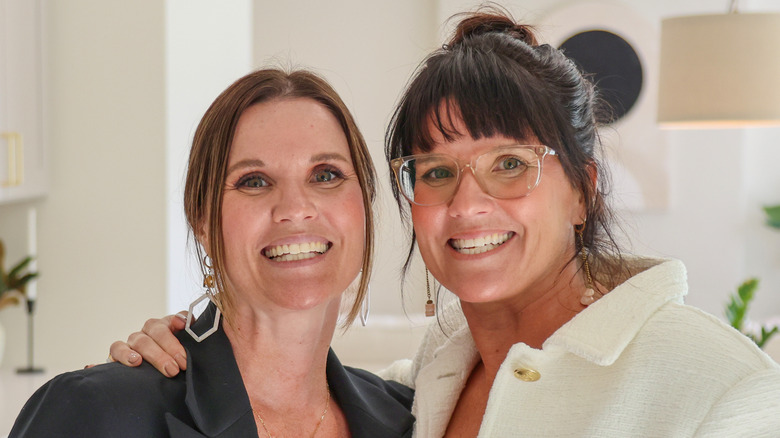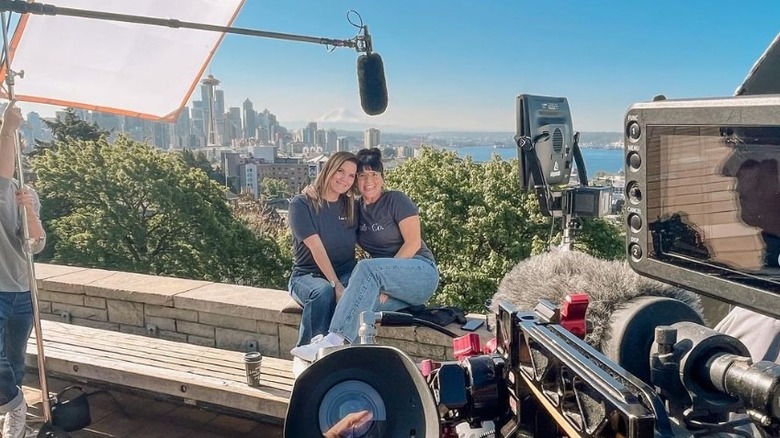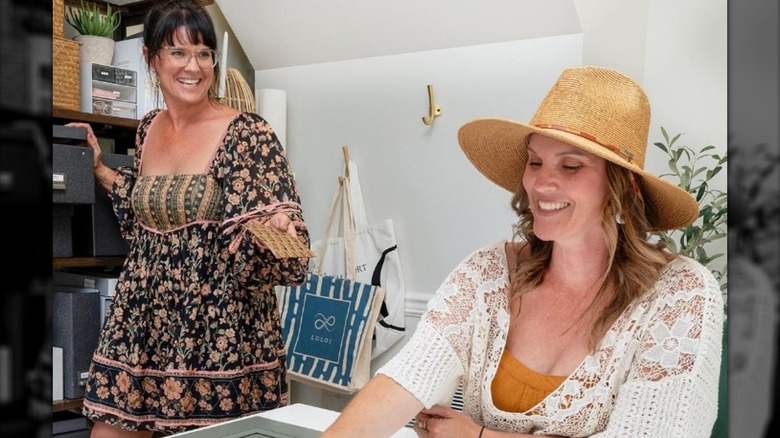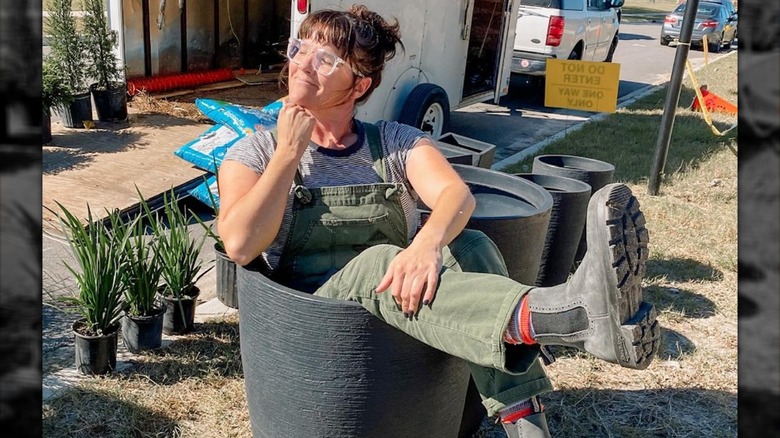Unsellable Houses' Lyndsay Lamb & Leslie Davis On Moving An Imperfect Property - Exclusive Interview
If you've ever had to sell a home, you understand how overwhelming it can feel to put a house on the market and how frustrating it is to watch potential buyers walk away. We may be going through a "sellers" phase right now, but that doesn't mean it's easy to get a home out of one owner's hands and into another's. In previous years, a few skeletons in the closet — or broken tiles in the kitchen — wouldn't dissuade a dedicated buyer, but now it seems that buyers are pickier than ever.
Twin sisters Leslie Davis and Lyndsay Lamb are two real estate consultants who know just how tricky it is to deal with an "unsellable" house, whether it has retina-searing wall colors, a severely outdated kitchen, or is just a little lacking in the landscaping department. Davis and Lamb are co-stars on HGTV's hit series "Unsellable Houses," where the duo helps sellers transform their hopeless homes into desirable dreamhouses. In an exclusive interview with House Digest, Lamb and Davis chatted with us about the upcoming fourth season of "Unsellable Houses," their sisterly superpowers, and the selling tips they've learned after years of turning messy, boring, and unwelcoming houses into the most beautiful homes on the block.
Season 4 brings new challenges and a closer look at life
Given the runaway popularity of "Unsellable Houses," it's no surprise that the two of you have been rewarded with a prime time slot [Sundays at 8/7c] for the new season. What kind of surprises can viewers expect when they tune in for Season 4?
Leslie Davis: We are so excited for the new time slot. This season is probably our most challenging season so far, given the drastic and sudden change in the real estate market during filming. That would've been September, October, November, last year. They can expect a lot of struggles in selling our homes and watching us have to make some hard decisions in our investments — in the past, we've had some really good selling markets, so it's been a lot easier for us to get offers.
Also, on the fun side, we've been able to include a lot more of our lives — our daily lives around Snohomish, [Washington], our family, some nonprofits that we're involved in, more about our business. It's been a lot of fun to share more about who we are this season and what we get excited about.
These sister sellers share an unspoken language
There are many of us out there who would never dare go into business with our siblings, regardless of how much we love them. Given your triumph in the real estate business and the popularity of "Unsellable Houses," what do you credit to your inspiring partnership?
Lyndsay Lamb: People ask us all the time about going into business with each other, and we always joke that it truly is a lifelong partnership since birth. We've always been inseparable. We've always been partners — partners in crime, partners on the playground, partners all the time. It was a no-brainer for us to go into business together.
We have a very unique trust in each other and unspoken loyalty to each other. With the show and with our daily business, the connection that we have as twins is so unique and so different, even from our other sibling, that it doesn't feel like a risk like it would with others. It feels like almost an extension of yourself. It doesn't seem like it's a big deal. It doesn't seem like it's a risk, whereas going into business with other family members may feel that way.
In a past interview, the two of you hinted at possessing a degree of twin intuition that can help inform your business decisions. Can you give an example of a time when an unspoken understanding between the two of you helped you sell an unsellable property?
Lamb: It happens all the time. We have an unspoken communication style. More often than not we'll be with a client, or in a meeting, or walking through a home that we're considering for the show — or whatever it may be — and we don't have to have those conversations of, "What did you think?" or, "What are your pros and cons about this?" or, "Do you want to take on this project?" or things like that. We know what the other one's opinion would be on that particular house or that particular project. It's this unspoken language where we can tell from each other's body language, or we can tell from the looks we give each other or from the situation that we're in, what the other one is thinking, and we play off of that a lot.
Davis: When we're in open houses, we kind of play good cop, bad cop. One of us takes the negotiating role, and one of us takes the, "Oh, I'm going to be your friend and show you around" role. We know who's going to play which role based on what Lyndsay was saying — the look we give each other, body language, or a head nod, or whatever. It helps us know what position to fall into. It's ... I don't know; it's weird. We don't communicate, but we communicate all the time.
Investing in real estate means riding the waves
Now that interest rates have gone up and property values remain high, both selling and buying a home come with new challenges. What advice can you offer to those relocating in 2023 to make the transition easier?
Davis: Oh, man, that's a good question ... It's the same advice I always give. Even though interest rates have gone up, real estate is still the number one place to put your money and invest. There's nowhere else that will get you the return on investment like real estate will.
As long as you are making an investment into something, real estate is still the place that will return your investment 5%, 6%, year over year. Even if that is down from 15% three years ago, it's still giving you a return on your money. You might [have] smaller buying power because your interest rate's up — therefore, what you can afford is less — but you're still going to be making money off your money.
Lamb: The other thing, too, is it's like boats in the harbor. When the tide comes in, one boat doesn't rise and the others stay the same. When the tide comes in, all the boats rise with the tide, and as the tide goes out, all the boats lower. So when a buyer says, "I want to sell my house now because it's a high market, and then I want to buy my house when the market goes down" — well, all the houses rise at the same time in prices, and they all lower at the same time in prices. It's not a "sell high and buy low" situation [ever]. You're always going to be stuck either selling high and buying high, or selling low and buying low.
You've got to decide which is the best scenario for you unless you're willing to rent for a while and wait out the market. Historically, our market has highs and lows, but they're not so dramatic that if you're paying $3,000 a month to rent you're coming out that high ahead. You've got to look at it as a long-term investment. Like Leslie said, there's nowhere else you can put that money and make a return on that investment every single year, guaranteed. You can look at every stock and bond and every safe bet out there, but you're going to be making way less on that investment. [Real estate] is still a really good bet.
Rein in the DIYs and focus on key areas
Leslie, as the brains behind the budgeting dimension of your operation, what are some shrewd tactics sellers can use to save money when renovating a property to sell?
Davis: Do the things that you are comfortable with and that you feel like you are capable of, but leave the items that need to be done for a professional to a professional, because you will end up having to redo them. Although that is going to cost you money, you need to make sure that you leave the tiling for a tile setter or the install of hardwood floors for a floor layer.
The things that you are competent in, painting front doors — wallpapering with a peel and stick, doing millwork trim of wainscoting, something like that — that can add texture, add character, add a pop. Landscaping — pots go so far out front for curb appeal, staging. Those are the things that we can take on ourselves as homeowners. But not trying to bite off more than you are able to chew is so important, because in the end, you're going to end up having to bring somebody in, and that's going to cost you more in the long run.
Lyndsay, given your love of spending time in your yard and garden, do you have any landscaping tips for homeowners who wish to boost their homes' curb appeal before selling? Or should they focus their attention elsewhere to get the best bang for their buck?
Lamb: I do love spending time outside. If you want to quickly add some color to the outside ... It takes a lot of time to mature a garden. If you haven't worked on that for years, it's hard to do in a short period of time, so do more of a planter-style garden. Getting planters, filling them with the in-season perennials at the time, and then placing those throughout your garden is a good way to add color to your garden. That way, you can also take them with you when you move.
The three easiest, least expensive, and fastest ways to make a change to your home is by changing out the hardware if it's dated. That includes light fixtures and such, painting, and addressing flooring if the flooring has been abused. Fixtures, paint, and flooring make a huge difference in making the house feel fresh and move-in ready. Then, container gardening if your yard hasn't been given a mature garden over the years — add color to your garden with containers.
Professional photos will put your listing in the spotlight
Leslie, in a past interview, you noted how important it is to optimize staging and photographing a house to appeal to potential buyers who are browsing listings online. What can sellers do to make their Zillow listings pop?
Davis: Hiring a professional photographer absolutely pays for itself. Even though we have these amazing phones that have great cameras, they still are not capable of getting the angles, getting the multiple levels of exposure, and editing your pictures the way that a professional can. You have one shot to make a first impression on a buyer. Buyers make their opinion of your home in the first couple of seconds of viewing that initial picture that they see, and we have to capture them immediately.
Hiring a professional photographer is crucial. [Make] sure that you are looking at the room not only as you see it in person, but stepping back and looking at it through a lens of a camera, because you're not always going to see it the same way. Standing in a room with blank walls looks clean, it looks peaceful, it looks like it's decluttered. But when you look at a photographed room with no artwork or nothing on the walls, it looks bare, it looks cold, it looks like it's not welcoming — and that is what the buyer's going to see. They're going to see that photo. It's really important not to rush the staging or photo-taking process, but take your time and make sure that you do it right because that first impression is everything.
Season 4 of "Unsellable Houses" premieres Sunday, September 10 at 8 p.m. ET/PT on HGTV. New episodes will be available to stream the same day on Max and HGTV GO.
This interview has been edited for length and clarity.




